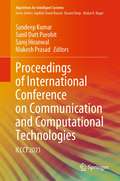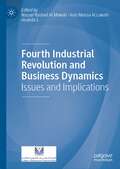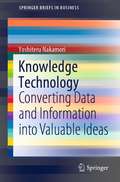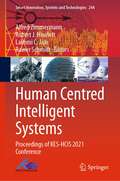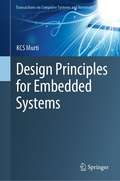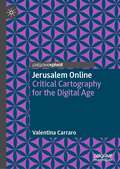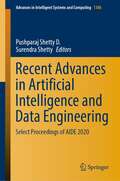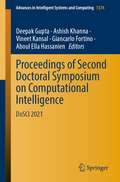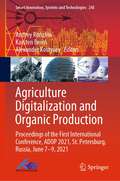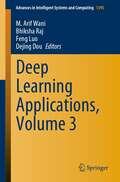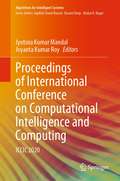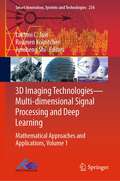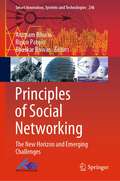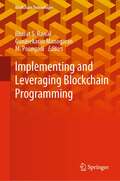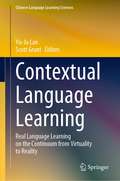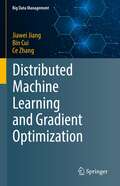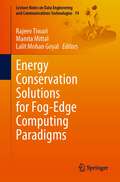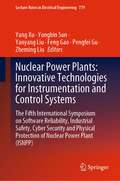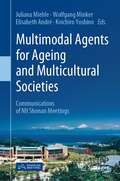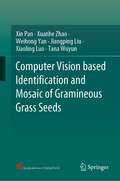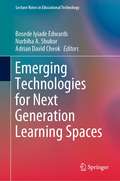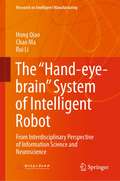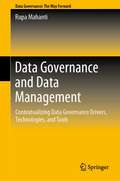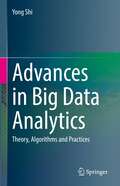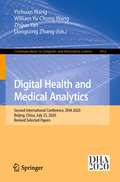- Table View
- List View
Proceedings of International Conference on Communication and Computational Technologies: ICCCT 2021 (Algorithms for Intelligent Systems)
by Sandeep Kumar Sunil Dutt Purohit Saroj Hiranwal Mukesh PrasadThis book gathers selected papers presented at 3rd International Conference on Communication and Computational Technologies (ICCCT 2021), jointly organized in virtual format by Rajasthan Institute of Engineering and Technology, Jaipur and Rajasthan Technical University Kota in association with Soft Computing Research Society, during 27–28 February 2021. The volume is a collection of state-of-the-art research work in the cutting-edge technologies related to communication and intelligent systems. The topics covered are algorithms and applications of intelligent systems, informatics and applications, and communication and control systems.
Fourth Industrial Revolution and Business Dynamics: Issues and Implications
by Nasser Rashad Al Mawali Anis Moosa Al Lawati Ananda SThe book explains strategic issues, trends, challenges, and future scenario of global economy in the light of Fourth Industrial Revolution. It consists of insightful scientific essays authored by scholars and practitioners from business, technology, and economics area. The book contributes to business education by means of research, critical and theoretical reviews of issues in Fourth Industrial Revolution.
Knowledge Technology: Converting Data and Information into Valuable Ideas (SpringerBriefs in Business)
by Yoshiteru NakamoriThis book reviews creative technologies that underpin the human activities of converting data and information into knowledge, creating new ideas based on that knowledge, and validating those ideas. The book calls such creative technology “knowledge technology” and explores its challenges in the age of big data. Today, artificial intelligence and big data are successfully performing pattern recognition and decision making on behalf of humans, who are incapable of processing large amounts of information instantly and accurately. In using only past data, however, there are limits to future predictions with artificial intelligence and big data. Humans need to take the lead in predicting or creating the future by trying to understand why data emerged. Knowledge technology contributes to that understanding, regardless of the field of origin. As a matter of fact, knowledge technology includes many technologies developed in informatics, management study, and systems science. The desirable features of knowledge technology are the complementary use of rational and intuitive approaches, the integration of results from quantitative and qualitative analyses, and the cooperation between artificial intelligence and humans.
Human Centred Intelligent Systems: Proceedings of KES-HCIS 2021 Conference (Smart Innovation, Systems and Technologies #244)
by Alfred Zimmermann Robert J. Howlett Lakhmi C. Jain Rainer SchmidtThis book highlights new trends and challenges in intelligent systems, which play an essential part in the digital transformation of many areas of science and practice. It includes papers offering a deeper understanding of the human-centred perspective on artificial intelligence, of intelligent value co-creation, ethics, value-oriented digital models, transparency, and intelligent digital architectures and engineering to support digital services and intelligent systems, the transformation of structures in digital business and intelligent systems based on human practices, as well as the study of interaction and co-adaptation of humans and systems. All papers were originally presented at the International KES Conference on Human Centred Intelligent Systems 2021 (KES HCIS 2021) held on June 14–16, 2021 in the KES Virtual Conference Centre.
Design Principles for Embedded Systems (Transactions on Computer Systems and Networks)
by KCS MurtiThe book is designed to serve as a textbook for courses offered to graduate and undergraduate students enrolled in electronics and electrical engineering and computer science. This book attempts to bridge the gap between electronics and computer science students, providing complementary knowledge that is essential for designing an embedded system. The book covers key concepts tailored for embedded system design in one place. The topics covered in this book are models and architectures, Executable Specific Languages – SystemC, Unified Modeling Language, real-time systems, real-time operating systems, networked embedded systems, Embedded Processor architectures, and platforms that are secured and energy-efficient. A major segment of embedded systems needs hard real-time requirements. This textbook includes real-time concepts including algorithms and real-time operating system standards like POSIX threads. Embedded systems are mostly distributed and networked for deterministic responses. The book covers how to design networked embedded systems with appropriate protocols for real-time requirements. Each chapter contains 2-3 solved case studies and 10 real-world problems as exercises to provide detailed coverage and essential pedagogical tools that make this an ideal textbook for students enrolled in electrical and electronics engineering and computer science programs.
Jerusalem Online: Critical Cartography for the Digital Age (The Contemporary City)
by Valentina CarraroThe book addresses the rapid shifts which have taken place within cartography, and argues that no amount of technological sophistication will lead to neutral representations, and that as such critical cartography provides a solid foundation for questioning the power of maps. It considers the fragmentation, dynamism and opacity that characterise online maps, and argues for the need of new ways of thinking and researching maps. The book offers an approach grounded in ‘ontological’ social theory and feminist technoscience, and illustrates it through the analysis of three Jerusalem-related mapping controversies. Using online media, historical maps and ethnographic work, each case study explores a different map provider and a recent mapping development: Google Maps and the distributed authorship of web-maps; Waze and algorithmic navigation; OpenStreetMap and crowdsourcing. The book is a key read to faculty and advanced students in Urban Studies and Critical Cartography. It will particularly appeal to those working in the digital geographies
Recent Advances in Artificial Intelligence and Data Engineering: Select Proceedings of AIDE 2020 (Advances in Intelligent Systems and Computing #1386)
by Pushparaj Shetty D. Surendra ShettyThis book presents select proceedings of the International Conference on Artificial Intelligence and Data Engineering (AIDE 2020). Various topics covered in this book include deep learning, neural networks, machine learning, computational intelligence, cognitive computing, fuzzy logic, expert systems, brain-machine interfaces, ant colony optimization, natural language processing, bioinformatics and computational biology, cloud computing, machine vision and robotics, ambient intelligence, intelligent transportation, sensing and sensor networks, big data challenge, data science, high performance computing, data mining and knowledge discovery, and data privacy and security. The book will be a valuable reference for beginners, researchers, and professionals interested in artificial intelligence, robotics and data engineering.
Proceedings of Second Doctoral Symposium on Computational Intelligence: DoSCI 2021 (Advances in Intelligent Systems and Computing #1374)
by Deepak Gupta Ashish Khanna Vineet Kansal Giancarlo Fortino Aboul Ella HassanienThis book features high-quality research papers presented at Second Doctoral Symposium on Computational Intelligence (DoSCI-2021), organized by Institute of Engineering and Technology (IET), AKTU, Lucknow, India, on 6 March 2021. This book discusses the topics such as computational intelligence, artificial intelligence, deep learning, evolutionary algorithms, swarm intelligence, fuzzy sets and vague sets, rough set theoretic approaches, quantum-inspired computational intelligence, hybrid computational intelligence, machine learning, computer vision, soft computing, distributed computing, parallel and grid computing, cloud computing, high-performance computing, biomedical computing, decision support and decision making.
Agriculture Digitalization and Organic Production: Proceedings of the First International Conference, ADOP 2021, St. Petersburg, Russia, June 7–9, 2021 (Smart Innovation, Systems and Technologies #245)
by Andrey Ronzhin Karsten Berns Alexander KostyaevThis book features selected papers presented at the First International Conference on Agriculture Digitalization and Organic Production (ADOP 2021), held in St. Petersburg, Russia, on June 07–09, 2021. The contributions, written by professionals, researchers and students, cover topics in the field of agriculture, biology, robotics, information technology and economics for solving urgent problems in digitalization of organic livestock and crop production. The conference is organized by the St. Petersburg Federal Research Center of the Russian Academy of Sciences (SPC RAS) and the Technische Universitat Kaiserslautern.The book will be useful to researchers of interdisciplinary issues of digitalization and robotization of agricultural production, as well as farmers and commercial companies, which introduce new technologies in crop production and animal husbandry. The book also covers a range of issues related to scientific training of graduate students in the areas of "Mechatronics and robotics", "Control in technical systems" and "Technologies, means mechanization and energy equipment in rural, forestry and fisheries”.
Deep Learning Applications, Volume 3 (Advances in Intelligent Systems and Computing #1395)
by M. Arif Wani Bhiksha Raj Feng Luo Dejing DouThis book presents a compilation of extended version of selected papers from the 19th IEEE International Conference on Machine Learning and Applications (IEEE ICMLA 2020) and focuses on deep learning networks in applications such as pneumonia detection in chest X-ray images, object detection and classification, RGB and depth image fusion, NLP tasks, dimensionality estimation, time series forecasting, building electric power grid for controllable energy resources, guiding charities in maximizing donations, and robotic control in industrial environments. Novel ways of using convolutional neural networks, recurrent neural network, autoencoder, deep evidential active learning, deep rapid class augmentation techniques, BERT models, multi-task learning networks, model compression and acceleration techniques, and conditional Feature Augmented and Transformed GAN (cFAT-GAN) for the above applications are covered in this book. Readers will find insights to help them realize novel ways of using deep learning architectures and algorithms in real-world applications and contexts, making the book an essential reference guide for academic researchers, professionals, software engineers in the industry, and innovative product developers.
Proceedings of International Conference on Computational Intelligence and Computing: ICCIC 2020 (Algorithms for Intelligent Systems)
by Jyotsna Kumar Mandal Joyanta Kumar RoyThis book includes the original, peer-reviewed research articles from the International Conference on Computational Intelligence and Computing (ICCIC 2020), held in September 2020 on a virtual platform jointly organized by SR Group of Institutions, Jhansi, India, IETE, Kolkata Centre, India, and Eureka Scientech Research Foundation, Kolkata India. It covers the latest research in image processing, computer vision and pattern recognition, machine learning, data mining, big data and analytics, information security and privacy, wireless and sensor networks and IoT applications, artificial intelligence, expert systems, natural language processing, image processing, computer vision, artificial neural networks, fuzzy logic, evolutionary optimization, rough sets, web intelligence, intelligent agent technology, virtual reality, and visualization.
3D Imaging Technologies—Multi-dimensional Signal Processing and Deep Learning: Mathematical Approaches and Applications, Volume 1 (Smart Innovation, Systems and Technologies #234)
by Lakhmi C. Jain Roumen Kountchev Junsheng ShiThis book presents high-quality research in the field of 3D imaging technology. The second edition of International Conference on 3D Imaging Technology (3DDIT-MSP&DL) continues the good traditions already established by the first 3DIT conference (IC3DIT2019) to provide a wide scientific forum for researchers, academia and practitioners to exchange newest ideas and recent achievements in all aspects of image processing and analysis, together with their contemporary applications. The conference proceedings are published in 2 volumes. The main topics of the papers comprise famous trends as: 3D image representation, 3D image technology, 3D images and graphics, and computing and 3D information technology. In these proceedings, special attention is paid at the 3D tensor image representation, the 3D content generation technologies, big data analysis, and also deep learning, artificial intelligence, the 3D image analysis and video understanding, the 3D virtual and augmented reality, and many related areas. The first volume contains papers in 3D image processing, transforms and technologies. The second volume is about computing and information technologies, computer images and graphics and related applications. The two volumes of the book cover a wide area of the aspects of the contemporary multidimensional imaging and the related future trends from data acquisition to real-world applications based on various techniques and theoretical approaches.
Principles of Social Networking: The New Horizon and Emerging Challenges (Smart Innovation, Systems and Technologies #246)
by Anupam Biswas Ripon Patgiri Bhaskar BiswasThis book presents new and innovative current discoveries in social networking which contribute enough knowledge to the research community. The book includes chapters presenting research advances in social network analysis and issues emerged with diverse social media data. The book also presents applications of the theoretical algorithms and network models to analyze real-world large-scale social networks and the data emanating from them as well as characterize the topology and behavior of these networks. Furthermore, the book covers extremely debated topics, surveys, future trends, issues, and challenges.
Implementing and Leveraging Blockchain Programming (Blockchain Technologies)
by Bharat S. Rawal Gunasekaran Manogaran M. PoongodiThis book gives a comprehensive overview of blockchain programming and its implementation in the wide range of blockchain-based applications such as cross-border payment, digital banking, and digital identities. The consistent thrive of the blockchain phenomenon and the ecosystem of e-business use cases have led to the Industrial Revolution in the e-business world, and it is demonstrated in this book. The digital advancement, interference, and transformation being brought through the influence of the blockchain advancements are creating waves across e-business verticals. The book caters to academics, industrial practitioners, and entrepreneurs working in the field of blockchain technology and programming.
Contextual Language Learning: Real Language Learning on the Continuum from Virtuality to Reality (Chinese Language Learning Sciences)
by Yu-Ju Lan Scott GrantThis book presents research and developments in the virtual, augmented technology and mixed-reality used in language learning and teaching. It provides the readers with a comprehensive overview of contextual language learning with the support of immersive technology. From theoretical foundations, methodological issues, the features of virtual and augmented reality, and educational practices of language learning, to the future of immersive technology for and research on language learning. During the past two decades, abundant research on different realities has recognized the potential of language learning in virtual, augmented, and mixed-reality environments (Wang et al., 2020; Lin & Lan, 2015). Given insufficient studies of Chinese learning in immersive contexts reported in existing literature, this book includes several excellent studies about using immersive technologies for Chinese learning in addition to other foreign langue learning, such as English as a foreign language (EFL). Since learning Chinese has grown significantly as a global trend, the authors vitally consolidate and synthesize various theoretical foundations, visions, and recent research and practices in the context of Chinese teaching from broader and more diverse perspectives. On the other hand, the chapters about EFL learning also shed light on the research on contextual language learning. Thus, the chapters included in this book will likely provide readers with a deep and extensive understanding of the potential of the smart combination of immersive technologies and language learning. More issues for future research will undoubtedly be inspired by reading the chapters in this book.
Distributed Machine Learning and Gradient Optimization (Big Data Management)
by Jiawei Jiang Bin Cui Ce ZhangThis book presents the state of the art in distributed machine learning algorithms that are based on gradient optimization methods. In the big data era, large-scale datasets pose enormous challenges for the existing machine learning systems. As such, implementing machine learning algorithms in a distributed environment has become a key technology, and recent research has shown gradient-based iterative optimization to be an effective solution. Focusing on methods that can speed up large-scale gradient optimization through both algorithm optimizations and careful system implementations, the book introduces three essential techniques in designing a gradient optimization algorithm to train a distributed machine learning model: parallel strategy, data compression and synchronization protocol. Written in a tutorial style, it covers a range of topics, from fundamental knowledge to a number of carefully designed algorithms and systems of distributed machine learning. It will appeal to a broad audience in the field of machine learning, artificial intelligence, big data and database management.
Energy Conservation Solutions for Fog-Edge Computing Paradigms (Lecture Notes on Data Engineering and Communications Technologies #74)
by Rajeev Tiwari Mamta Mittal Lalit Mohan GoyalThis book focuses on energy efficiency concerns in fog–edge computing and the requirements related to Industry 4.0 and next-generation networks like 5G and 6G. This book guides the research community about practical approaches, methodological, and moral questions in any nations’ journey to conserve energy in fog–edge computing environments. It discusses a detailed approach required to conserve energy and comparative case studies with respect to various performance evaluation metrics, such as energy conservation, resource allocation strategies, task allocation strategies, VM migration, and load-sharing strategies with state-of-the-art approaches, with fog and edge networks.
Nuclear Power Plants: The Fifth International Symposium on Software Reliability, Industrial Safety, Cyber Security and Physical Protection of Nuclear Power Plant (ISNPP) (Lecture Notes in Electrical Engineering #779)
by Yang Xu Yongbin Sun Yanyang Liu Feng Gao Pengfei Gu Zheming LiuThis book is a compilation of selected papers from the fifth International Symposium on Software Reliability, Industrial Safety, Cyber Security and Physical Protection of Nuclear Power Plant, held in November 2020 in Beijing, China. The purpose of this symposium is to discuss Inspection, test, certification and research for the software and hardware of Instrument and Control (I&C) systems in nuclear power plants (NPP), such as sensors, actuators and control system. It aims to provide a platform of technical exchange and experience sharing for those broad masses of experts and scholars and nuclear power practitioners, and for the combination of production, teaching and research in universities and enterprises to promote the safe development of nuclear power plant. Readers will find a wealth of valuable insights into achieving safer and more efficient instrumentation and control systems.
Multimodal Agents for Ageing and Multicultural Societies: Communications of NII Shonan Meetings
by Juliana Miehle Wolfgang Minker Elisabeth André Koichiro YoshinoThis book aims to explore and discuss theories and technologies for the development of socially competent and culture-aware embodied conversational agents for elderly care. To tackle the challenges in ageing societies, this book was written by experts who have a background in assistive technologies for elderly care, culture-aware computing, multimodal dialogue, social robotics and synthetic agents. Chapter 1 presents a vision of an intelligent agent to illustrate the current challenges for the design and development of adaptive systems. Chapter 2 examines how notions of trust and empathy may be applied to human–robot interaction and how it can be used to create the next generation of emphatic agents, which address some of the pressing issues in multicultural ageing societies. Chapter 3 discusses multimodal machine learning as an approach to enable more effective and robust modelling technologies and to develop socially competent and culture-aware embodied conversational agents for elderly care. Chapter 4 explores the challenges associated with real-world field tests and deployments. Chapter 5 gives a short introduction to socio-cognitive language processing that describes the idea of coping with everyday language, irony, sarcasm, humor, paralinguistic information such as the physical and mental state and traits of the dialogue partner, and social aspects. This book grew out of the Shonan Meeting seminar entitled “Multimodal Agents for Ageing and Multicultural Societies” held in 2018 in Japan. Researchers and practitioners will be helped to understand the emerging field and the identification of promising approaches from a variety of disciplines such as human–computer interaction, artificial intelligence, modelling, and learning.
Computer Vision based Identification and Mosaic of Gramineous Grass Seeds
by Xin Pan Xuanhe Zhao Weihong Yan Jiangping Liu Xiaoling Luo Tana WuyunThis book mainly deals with grassland digitalization and recognition through computer vision, which will make contributions to implement of grass auto recognition and data acquisition. Taking advantage of computer vision, it focuses on intrinsic feature extraction to realize the functions such as auto recognition of forage seeds and microscope images mosaic. The book presents a new approach for identification of grass seeds, with clear figures and detailed tables. It enlightens reader by solving the traditional problems of pratacultural science through the aid of computer science.
Emerging Technologies for Next Generation Learning Spaces (Lecture Notes in Educational Technology)
by Bosede Iyiade Edwards Nurbiha A. Shukor Adrian David CheokThis book discusses the development of the next generation learning spaces with emerging technologies. These spaces result from the combined needs of classroom stakeholders, such as instructors and learners, with classroom elements, such as tools and technologies, pedagogy and content. The book presents discussions and studies on issues, possibilities and implications of these changes for next generation education. Novel ideas, and studies on these all-encompassing, blended roles of technologies in next generation learning spaces are clearly presented. Suggestions on how the benefits they offer can be maximized are also discussed. Engaging learning technologies have remained central in education for assisting instructors to teach and learners to learn, more effectively. However, recent technological growth is creating a system in which previous divides between key classroom concepts and stakeholders are getting progressively blurred. This is giving rise to next generation learning spaces where elements and stakeholders are blended into one. The book addresses the future of learning environments based on these perspectives.
The “Hand-eye-brain” System of Intelligent Robot: From Interdisciplinary Perspective of Information Science and Neuroscience (Research on Intelligent Manufacturing)
by Hong Qiao Chao Ma Rui LiThis book reports the new results of intelligent robot with hand-eye-brain, from the interdisciplinary perspective of information science and neuroscience. It collects novel research ideas on attractive region in environment (ARIE), intrinsic variable preserving manifold learning (IVPML) and biologically inspired visual congnition, which are theoretically important but challenging to develop the intelligent robot. Furthermore, the book offers new thoughts on the possible future development of human-inspired robotics, with vivid illustrations. The book is useful for researchers, R&D engineers and graduate students working on intelligent robots.
Data Governance and Data Management: Contextualizing Data Governance Drivers, Technologies, and Tools
by Rupa MahantiThis book delves into the concept of data as a critical enterprise asset needed for informed decision making, compliance, regulatory reporting and insights into trends, behaviors, performance and patterns. With good data being key to staying ahead in a competitive market, enterprises capture and store exponential volumes of data. Considering the business impact of data, there needs to be adequate management around it to derive the best value. Data governance is one of the core data management related functions. However, it is often overlooked, misunderstood or confused with other terminologies and data management functions. Given the pervasiveness of data and the importance of data, this book provides comprehensive understanding of the business drivers for data governance and benefits of data governance, the interactions of data governance function with other data management functions and various components and aspects of data governance that can be facilitated by technology and tools, the distinction between data management tools and data governance tools, the readiness checks to perform before exploring the market to purchase a data governance tool, the different aspects that must be considered when comparing and selecting the appropriate data governance technologies and tools from large number of options available in the marketplace and the different market players that provide tools for supporting data governance. This book combines the data and data governance knowledge that the author has gained over years of working in different industrial and research programs and projects associated with data, processes and technologies with unique perspectives gained through interviews with thought leaders and data experts. This book is highly beneficial for IT students, academicians, information management and business professionals and researchers to enhance their knowledge and get guidance on implementing data governance in their own data initiatives.
Advances in Big Data Analytics: Theory, Algorithms and Practices
by Yong ShiToday, big data affects countless aspects of our daily lives. This book provides a comprehensive and cutting-edge study on big data analytics, based on the research findings and applications developed by the author and his colleagues in related areas. It addresses the concepts of big data analytics and/or data science, multi-criteria optimization for learning, expert and rule-based data analysis, support vector machines for classification, feature selection, data stream analysis, learning analysis, sentiment analysis, link analysis, and evaluation analysis. The book also explores lessons learned in applying big data to business, engineering and healthcare. Lastly, it addresses the advanced topic of intelligence-quotient (IQ) tests for artificial intelligence.Since each aspect mentioned above concerns a specific domain of application, taken together, the algorithms, procedures, analysis and empirical studies presented here offer a general picture of big data developments. Accordingly, the book can not only serve as a textbook for graduates with a fundamental grasp of training in big data analytics, but can also show practitioners how to use the proposed techniques to deal with real-world big data problems.
Digital Health and Medical Analytics: Second International Conference, DHA 2020, Beijing, China, July 25, 2020, Revised Selected Papers (Communications in Computer and Information Science #1412)
by Yichuan Wang William Yu Chung Wang Zhijun Yan Dongsong ZhangThis book constitutes selected and revised papers from the Second International Conference on Digital Health and Medical Analytics, DHA 2020, held in Beijing, China, in July 25, 2020.The 5 full papers and 7 short papers presented in this volume were thoroughly reviewed and selected from 75 submissions. The papers present discussion on such topics as social networks, analytics and engagement with health devices, big data, public health surveillance, persuasive technologies, epidemic intelligence, participatory surveillance, emergency medicine, serious games for public health interventions and automated early identification of health threats and responses.
